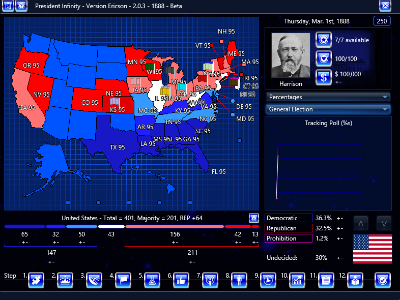*This scenario was greatly updated by the Historical Scenario Commission on August 21, 2017 and can be downloaded here: United States – 1888 v. 2.0
This election takes place in the Gilded Age of American history. Grover Cleveland is the incumbent president. Despite building a strong economy, his severely pro-business policies have alienated rural and labor voters. Will Cleveland’s lack of interest in leading his own party as a harmonious unit hurt him in the election or will the country’s economic success land him four more years?
For the Democrats, even the unhappy Southern and Western Democratic leaders reluctantly supported Cleveland, despite his unwillingness to compromise on his Bourbon Democratic positions.
For Republicans, the field is wide open. Front runner, and last election’s nominee, James G. Blaine, the leader of the moderate Republicans has declined to run for president. This leaves John Sherman, the brother of General William T. Sherman, as the new front runner. However, Russell Alger, Walter Gresham and many others have many supporters. A quasi-dark horse is former senator Benjamin Harrison, the grandson of a former president.
The Prohibition Party is the 3rd party option. General Clinton Fisk was a civil war hero, civil rights activist and a prohibitionist. Can he expand the party?
The scenario allows for many what-ifs:
- What if Grover Cleveland’s nomination was contested? Several politicians that were former Confederate generals can try to deprive Cleveland of the nomination. These include Simon Boliver Buckner, John Brown Gordon, Wade Hampton, Fitzhugh Lee and William Henry Fitzhugh Lee.
- What if John Quincy Adams II, son of an ambassador and grandson and great-grandson of two presidents, tried to run for president? Can he gain traction outside of Massachusetts?
- What if pro-Silver Democrat Richard Bland ran for rural voters out west?
- What if the leader of the moderate Republicans, James G. Blaine had run. He was the presumed front runner.
- What if Rep. William McKinley did not refuse to run?
- Two sons of presidents were pushed to run, but did not. What if Robert Todd Lincoln and Frederick Dent Grant ran for the presidency?
- Former slave and civil right orator Frederick Douglass received some token delegates in 1888. What if civil rights activists supported his running for president. Could he become the first African-American president?
- The Greenback Party declined to run a candidate in 1888. What if they had run James Weaver again?
Note: endorsers will also mention if a politician was a Civil War hero for the enjoyment of Civil War buffs that might play this game. This was done in the 1892 scenario as well, and will be done in the elections between 1864-1892.
Feedback is welcome. Updates and improvements will eventually arrive.

